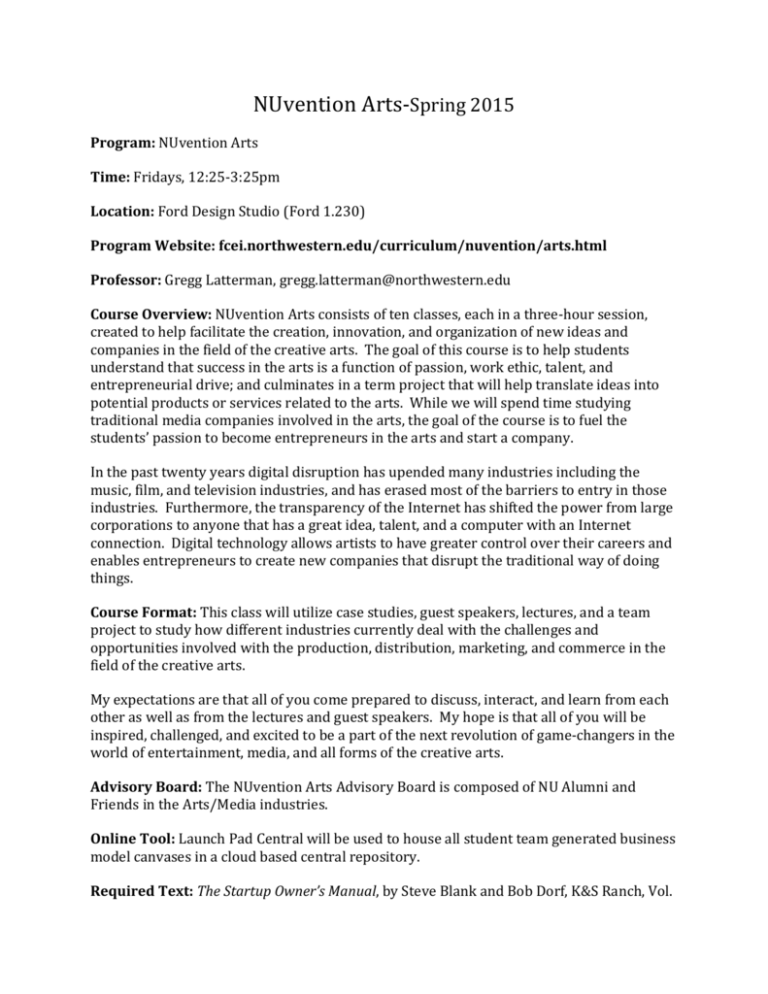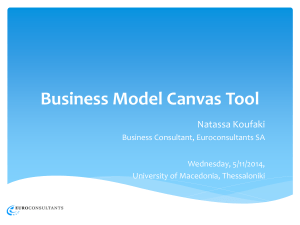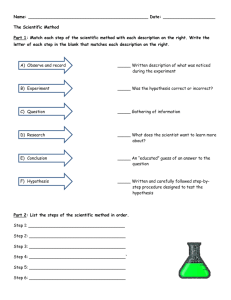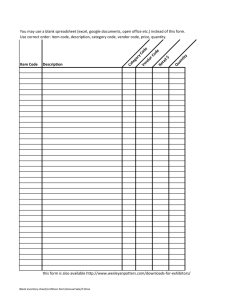the latest syllabus - Farley Center for Entrepreneurship and Innovation
advertisement

NUvention Arts-Spring 2015 Program: NUvention Arts Time: Fridays, 12:25-3:25pm Location: Ford Design Studio (Ford 1.230) Program Website: fcei.northwestern.edu/curriculum/nuvention/arts.html Professor: Gregg Latterman, gregg.latterman@northwestern.edu Course Overview: NUvention Arts consists of ten classes, each in a three-hour session, created to help facilitate the creation, innovation, and organization of new ideas and companies in the field of the creative arts. The goal of this course is to help students understand that success in the arts is a function of passion, work ethic, talent, and entrepreneurial drive; and culminates in a term project that will help translate ideas into potential products or services related to the arts. While we will spend time studying traditional media companies involved in the arts, the goal of the course is to fuel the students’ passion to become entrepreneurs in the arts and start a company. In the past twenty years digital disruption has upended many industries including the music, film, and television industries, and has erased most of the barriers to entry in those industries. Furthermore, the transparency of the Internet has shifted the power from large corporations to anyone that has a great idea, talent, and a computer with an Internet connection. Digital technology allows artists to have greater control over their careers and enables entrepreneurs to create new companies that disrupt the traditional way of doing things. Course Format: This class will utilize case studies, guest speakers, lectures, and a team project to study how different industries currently deal with the challenges and opportunities involved with the production, distribution, marketing, and commerce in the field of the creative arts. My expectations are that all of you come prepared to discuss, interact, and learn from each other as well as from the lectures and guest speakers. My hope is that all of you will be inspired, challenged, and excited to be a part of the next revolution of game-changers in the world of entertainment, media, and all forms of the creative arts. Advisory Board: The NUvention Arts Advisory Board is composed of NU Alumni and Friends in the Arts/Media industries. Online Tool: Launch Pad Central will be used to house all student team generated business model canvases in a cloud based central repository. Required Text: The Startup Owner’s Manual, by Steve Blank and Bob Dorf, K&S Ranch, Vol. 1-2012 Jab, Jab, Jab, Right Hook: How To Tell Your Story In A Noisy Social World, by Gary Vaynerchuck, Harper Business, 2013 Goal: My overall goal is to help motivate you to all become entrepreneurs in the Arts. Grading: Assignments: Your final grade will be composed of: 1. Attendance and Class Contribution 2. Individual Digital Disruption Paper (due week 2) 3. Individual Calling Paper (due week 3) 4. Business Model Canvas (due week 4) 5. Test the Problem (due week 5) 6. Test the Product Solution (due week 6) 7. Update and Interviews (due week 7) 8. Social Media/Digital Marketing Plan (due week 8) 9. Peer Assessment 10. Group Project (week 10) 20% 10% 10% 5% 5% 5% 5% 5% 10% 25% Attendance and Course Contribution (20%) Individual Participation: It is imperative for this class that you are fully prepared for the lectures and discussions based on the readings and assignments. All students must be prepared to share their ideas, interpretations, and perspectives of the subject matter and be ready to add value to the class through their participation. This is a class structured to go beyond what is in the books, lectures, slides, etc. and to make you think about where you are in your life and where you are going in the future. All of your views on the subject matter are very important to the learning process in this course and your willingness to engage in class is essential to the progression of this course. Thinking beyond what is in front of you may be a challenge, but I am confident that with the proper amount of effort and passion, the journey this semester will be worth it. Attending all the classes and participating in every discussion is expected and mandatory. Individual Digital Disruption Paper (10%) Write a 2-page paper (double spaced) about Digital Disruption and how it affects the arts industry you plan on being involved with in your career. You must use 3 references from the readings from week 2. Individual Calling Paper (10%) Write a 2-page paper (double-spaced) about the company that you want to create that would be a calling for you. DREAM BIG…You must use 3 references from any of the readings this semester. Business Model Canvas-First Draft (5%) Phase 1: The first draft of your Business Model Canvas is due: The Business Model Canvas should include your hypothesis for all nine components of your business idea. Test the Problem (5%) Phase 2: Test the problem. Get out of the building and test your “problem” hypothesis through interviews (min. 10) with potential customers/consumers. Test the Product Solution (5%) Phase 3: Test the Product Solution. Now that you’ve thought up a solution to the problem you’re tackling, go out and interview at least 10 more customers with your solution in mind. B Update and Interviews (5%) Continue going out and interviewing your customers with the insights you’ve gained from your previous interviews in mind. Interview at least 10 more customers. wuf Social Media/Digital Marketing Plan for Venture (5%) Social Media/Digital Marketing Plan for your business venture Peer Assessment (10%) Each student will have 100 points to distribute to the members of their group (including yourself). In addition, you will describe in a sentence what you felt each group member contributed to your project. Group Project (25%) Each group will present to our class board of directors, faculty, and guests their business venture. Each group will present for fifteen minutes and will then answer questions from the panel (max. of 20 slides). Pre-Class-Mandatory All participants in the class will meet for Pizza and discussion to go over expectations for the class. Week 1: Introduction to NUvention: Arts: April 3rd This semester we will be studying Entrepreneurship in the Arts. We will focus on the music, film, television, and literature industries, and discuss other related arts including: (theater, dance, photography, cooking, winemaking, painting, drawing, craftsman movement, etc.). Entrepreneurs in the arts must be able to balance creativity with business acumen to create profitable, long-term sustainable businesses. The digital revolution has enabled anyone that wants to be involved in the arts to do it even if they do not have any artistic talent per se. Technology today has made it easy for anyone to be in the arts and to become an entrepreneur and make a living doing what they love. Readings (required prior to class): The Start-Up of You, by Reid Hoffman & Ben Casnocha, pp. 1-24 Why the Lean Start-Up Changes Everything, by Steve Blank, hbr.org/2013/05/why-the-leanstart-up-changes-everything Jab, Jab, Jab, Right Hook: How To Tell Your Story In A Noisy Social World, by Gary Waynerchuck, pp. 1-28 Industry Blogs/Websites (not required): ycombinator.com, techstars.com, theimpactengine.com, angel.co, steveblank.com, crunchbase.com, googletrends.com, technori.com Prepare for class: (Please bring to Class 1) One-sheet summary on what industry related to the arts you are most interested in for this class. Be prepared to present to the class and discuss and defend your interest in the subject. Each student will have two minutes to tell their story of who they are and what subject in the arts they are interested in. In addition, on a 8.5 x 11 piece of paper, visually represent your business idea in the arts. The purpose of this exercise it to get to know all of you better and to help put you in groups according to your interests and ideas. BY THE END OF CLASS 1 YOU WILL HAVE YOUR GROUP FOR YOUR PROJECT. Week 2: Digital Disruption/The Entrepreneurial Revolution: April 10th The entertainment/media business has drastically changed in the past twenty years in the way that products are developed, marketed, and distributed. The first industries that were affected by the Internet were the music and print industries and were quickly followed by the film and TV industries. Today, content can come from anyone at anytime; no longer is the distribution controlled by the large content companies, anyone with a great idea will be heard. The goal is to harness innovation and creativity to become entrepreneurs in the arts both in the traditional sense and any new and emerging outlets. The New Digital Age, by Eric Schmidt & Jared Cohen, pp. 1-31 Digital Disruption, by James McQuivey, pp. 3-16 Zero to One, by Peter Thiel, pp. 12-43 The Long Tail, by Chris Anderson, pp. intro-40 HBS Case Study: Opening Pandora’s Box Industry Blogs/Websites (not required): inc.com, entrepreneur.com, fastcompany.com, hbr.org, startupnation.com, under30ceo.com, bothsidesofthetable.com Paper: (Due 24 hours prior to Class 2) Write a 2-page paper (double spaced) about Digital Disruption and how it affects the arts industry you plan on being involved with in your career. You must use 3 references from the readings above. Week 3: The Music Business/Find Your Calling: April 17th The music business was the first industry to be disrupted by the Internet. While the traditional music business (major labels, publishers, etc.) has been upended, the opportunities for new models are endless for new entrepreneurs. Readings (required prior to class): Appetite for Self-Destruction, by Steve Knopper, pp. 157-182 The Startup Owner’s Manual, by Steve Blank & Bob Dorf, Chapters 1-2 Watch Steve Blank Udacity Lessons 0-1.5B HBS Case Study: Beyonce Industry Blogs/Websites (not required): nextbigsound.com, musicweek.com, lefsetz.com, billboard.com, hitsdailydouble.com, hypebot.com, mi2n.com, tunefind.com, stereogum.com Individual Calling Paper (10%) Write a 2-page paper (double-spaced) about the company that you want to create that would be a calling for you. DREAM BIG…you must use 3 references from any of the readings this semester. Week 4: Film, TV, & Digital Media/ Business Model Canvas: April 24th Prior to the digital revolution if you wanted a career in the film and TV world you moved to Hollywood and started in the mail room (CAA, William Morris, etc.). Now anyone can communicate instantly through video, music, pictures, and words directly with anyone in the world. Thus, an Internet connection combined with talent, hard work, and a little luck can allow anyone a career in the film, TV, and digital media industry today. Readings (required prior to class): “Video Reinvents the Web as the Majors Scramble to Cash In, by Tiernan Ray, online.barrons.com/articles/video-reinvents-the-web-amid-key-firms-focus-1417847381 The Startup Owner’s Manual, by Steve Blank & Bob Dorf, Chapters 3-4 Watch Steve Blank Udacity Lessons 2-3 HBS Case Study: NBC Universal Industry Blogs/Websites (not required): hollywoodreporter.com, variety.com, indiewire.com, huffingtonpost.com/tv/, thewrap.com, gawker.com Assignment (Due 24 hours prior to Class 4) Phase 1: The first draft of your Business Model Canvas is due: The Business Model Canvas should include your hypothesis for all nine components of your business idea. Week 5: Presentation of Business Venture/ Customer Discovery: May 1st The Startup Owner’s Manual, by Steve Blank & Bob Dorf, Chapter 5 Assignment: (Due 24 hours prior to Class 5) Phase 2: Test the problem. Get out of the building and test your “problem” hypothesis through interviews (min. 10) with potential customers/consumers. Be sure to: 1. Update your Business Model Canvas based on what you have learned through your hypothesis testing on Launchpad Central. 2. Log all of your interviews (min. 10) on Launchpad Central. For every interview, write a 1-2 sentence summary, conclusion or insight about the interview. Also, note if this interview validates or invalidates any hypothesis your BMC. In Class Each group will have ten minutes to present their business venture idea to our guest speaker, the class, and myself. What is your Value Proposition, who is your Target Customer/Segment, what are the key insights from your Customer Discovery process, and how will you make Revenue/Profits. Week 6: The Evolution of Print Media/Product Solution: May 8th In this class we will explore and discuss how digital technologies have revolutionized the traditional media business and created a new online world with unlimited distribution channels. We will discuss how traditional media companies are coping as well as the opportunities and challenges as an entrepreneur in the digital world. Readings (required prior to class): GSB Case Study: Axel Springer in 2014: Strategic Leadership Of The Digital Media Transformation The Startup Owner’s Manual, by Steve Blank & Bob Dorf, Chapters 5-6 Watch Steve Blank Udacity Lessons 4-5 Industry Blogs/Websites (not required): mediabistro.com, talkingnewmedia.com, niemanlab.org, reddit.com, gawker.com, medium.com Assignment (Due 24 hours prior to Class 6) Phase 3: Test the Product Solution. Now that you’ve thought up a solution to the problem you’re tackling, go out and interview at least 10 more customers with your solution in mind. Be sure to: 1. Update your Business Model Canvas based on what you have learned through your hypothesis testing on Launchpad Central. 2. Log all of your interviews (min. 10) on Launchpad Central. For every interview, write a 1-2 sentence summary, conclusion or insight about the interview. Also, note if this interview validates or invalidates any hypothesis your BMC. Week 7: Maker Movement (Create, Make, Sell): May 15th We will explore how digital technology and the Internet have helped new companies and products to flourish based on traditional consumer goods and the Arts. Could this be the Third Industrial Revolution? The growing craftsman movement in America is allowing consumers to choose products that are made locally and to purchase products that are handcrafted (Etsy); invented by an online community (Quirky); fund and market creative projects (Kickstarter); and build things through an online hardware store for designers (Inventables). Readings (required prior to class): Mark Dwight: Founder of Rickshaw Bagworks and SFMade: www.plywerk.com/blog/2013/12/its-show-business-mark-dwight-rickshaw-bagworks-2/ GSB Case Study: Quirky: A Business Based on Making Invention Accessible The Startup Owner’s Manual, by Steve Blank & Bob Dorf, Chapter 7 Watch Steve Blank Udacity Lessons 6-7 Industry Blogs/Websites (not required): quirky.com, etsy.com, inventable.com, makerplace.com Assignment (Due 24 hours prior to Class 7) Continue going out and interviewing your customers with the insights you’ve gained from your previous interviews in mind. Interview at least 10 more customers. Be sure to: 1. Update your Business Model Canvas based on what you have learned through your hypothesis testing on Launchpad Central. 2. Log all of your interviews (min. 10) on Launchpad Central. For every interview, write a 1-2 sentence summary, conclusion or insight about the interview. Also, note if this interview validates or invalidates any hypothesis your BMC. Week 8: Social Media/Digital Marketing/Customer Acquisition: May 22nd Social media is essential to marketing, product development, fundraising, customer service, networking, and just about every dimension of doing business and interacting with customers today. The students will discuss how they use social media (Facebook, Twitter, Instagram, Pinterest, Tumblr, youtube, etc.) in their everyday lives and how to utilize social media for all aspects of a company. Companies like Kickstarter and Indiegogo are not only used for funding new products but also refining their products to ensure a proper market fit and demand upon launch from the funders feedback. Readings (required prior to class): “21 Rules for Social Media Engagement” by Brian Solis Jab, Jab, Jab, Right Hook: How To Tell Your Story In A Noisy Social World, by Gary Waynerchuck, pp. 29-115, 151-169 GBS Case Study: Minted in 2014: Scaling and Scoping a Crowdsourcing Design Business Watch Steve Blank Udacity Lessons 8 Industry Blogs/Websites (not required): mashable.com, gawker.com, readwrite.com, buzzfeed.com, pando.com Assignment (Due 24 hours prior to Class 8) Social Media/Digital Marketing plan for your business venture. Week 9: Presentation Practice: May 29th This class will be used for all of you to have a dry run of your presentations with Brian Burkhart from Squareplanet, and myself. Week 10: Final Presentations: June 5th Each group will present to our class advisory board, faculty, and guests their business venture. Each group will present for fifteen minutes and will then answer questions from the panel (max. of 20 slides).




